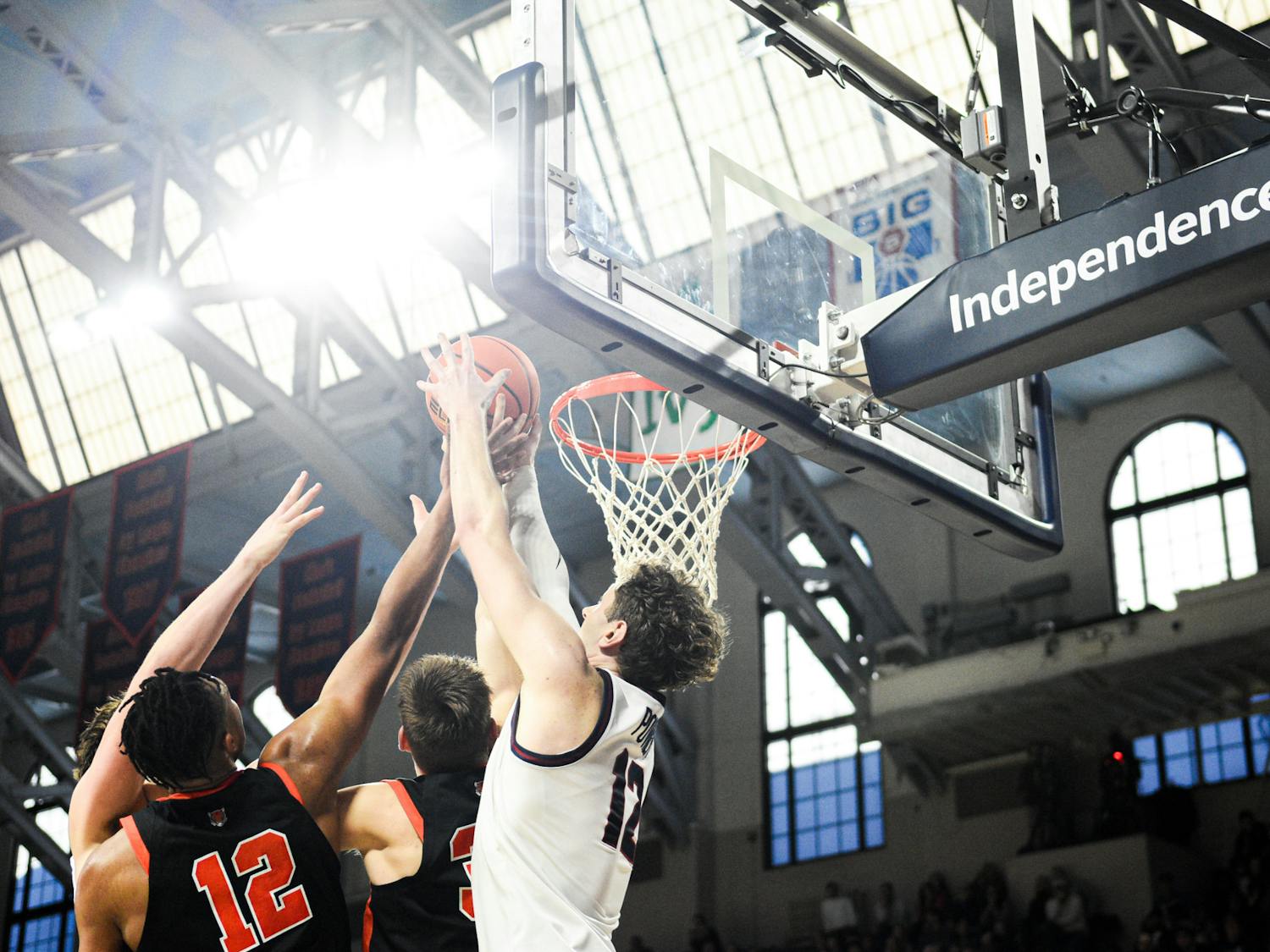For most people, the end of December is a time for new beginnings. But for Penn men’s basketball, a Saturday afternoon bout at the end of January marked what the team hopes will be a turning point.
The Quakers entered the game on a three-game conference losing streak. But when the final buzzer sounded on an 83-68 win for Penn (11-11, 3-4 Ivy), the victory marked the start of what the team hopes to turn into a win streak.
Saturday’s result puts Penn in the thick of the Ivy League table halfway through the conference season. What’s better is that most of the team’s remaining games are at the Palestra, where the team feels most comfortable.

“In college basketball, it’s difficult to win, period," coach Steve Donahue said. “But it’s really difficult to win on the road. You [shouldn't] lighten up at home, but there’s obviously a lot of advantages.”
To win against Harvard (12-9, 3-4), it was no doubt that Jordan Dingle would have to show up and show out. The junior guard entered the bout against the Crimson averaging 23.8 points per game, the third best in all of NCAA Division I basketball. At the Palestra, before a rollicking crowd, he delivered.
Dingle hit a pair of long-range shots within the first five minutes of the game. He followed it up with consistent shooting throughout the remainder of the first half, finishing the period with 17 points after going 5-9 from the floor, including 3-5 from three.

But Saturday's scoring didn't rely all on Dingle, a weak spot in Penn's past performances this season. Around him, the rest of the team stepped up. Junior guard/forward Max Martz made four of six shots from deep in the first half, entering halftime with 14 points.
“Now [Martz] is one of the more experienced players in the league, and I think he understands what it takes to win in the league,” Donahue said. “I loved how he was kind of hunting shots more, which really helps our offense as well.”
This effort was enough for Penn to score 50 points in the first half — one of its largest totals of the season.

While Penn’s offense let up slightly in the second half, the Quakers were still able to make enough key shots to maintain their double-digit lead. Whenever Harvard seemed to be closing in, a Quaker on the defense would make a play to stump the Crimson’s momentum and re-energize the Palestra crowd.
“We really work on our catch-and-shoot threes and shooting standstill shots every day in practice,” sophomore guard George Smith said. “We have guys … who can make plays and get guys open just like [I was] today, and [I’m working to] just be confident and be prepped to knock it down.”

This year’s Red and Blue team shoots a lot of threes, and Saturday was no exception, with over a third of the team’s shots coming from beyond the arc. But against Harvard, it worked. Penn made nine threes, and finished the first half 8-16 from deep. In the second half, the team only shot 3-11 from long range, but it was enough to hold the lead.
“We haven’t shot enough catch-and-shoots as we should have,” Donahue said. “We really emphasized. over the last couple of weeks, taking the open shot or being prepared to shoot.”
What was even more impressive was how thoroughly Penn contained Harvard’s players. Only three Crimson players finished in double figures, and the team as a whole shot a suboptimal 35% from the field — including Harvard's Chris Ledlum, who was averaging nearly 20 points per game before facing the Quakers. At the Palestra, he was on pace to exceed that, with 14 points in the first half. However, after halftime, he was held to only 7 points.

The Quakers also showed off their hustle on the offensive end, making put-back shots and snagging key offensive rebounds to give Penn extra possessions. By the end of the game, Penn had 10 offensive rebounds and 14 second-chance points. But while Penn’s offense might have been enough to win them the game, such a thorough domination wouldn’t have been possible without an impeccable defensive performance as well. The Quakers consistently jumped passing lanes, forcing 11 Harvard turnovers which led to 17 points on the other end.
The Quakers return to the court on Friday night against Columbia (6-16, 1-6) at the Palestra, where they hope to replicate their 84-55 victory over the Lions from Jan. 7.









